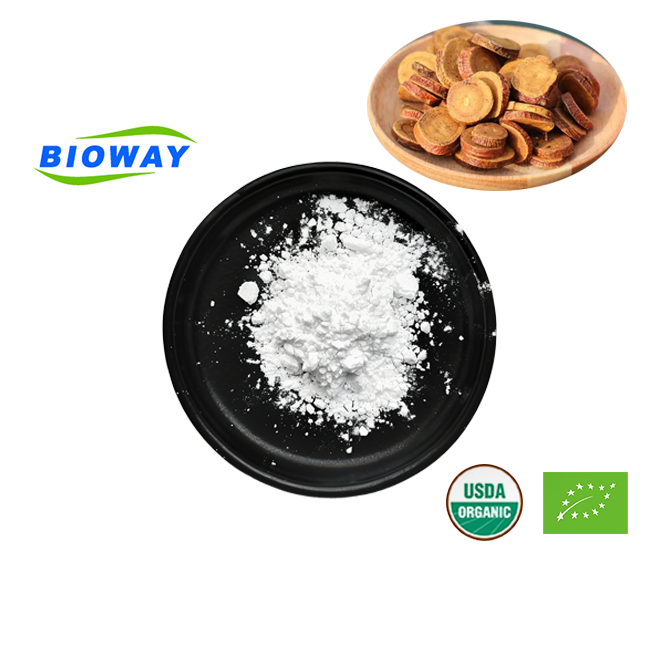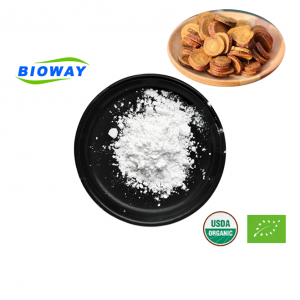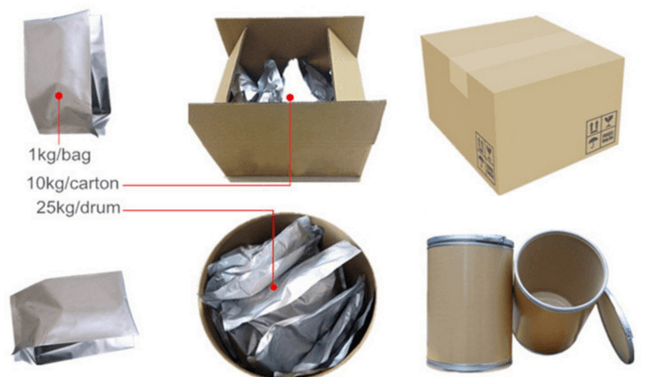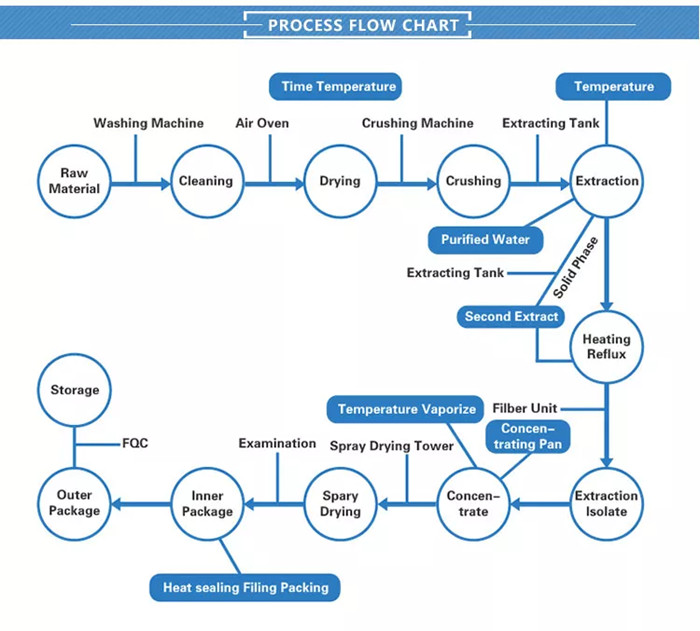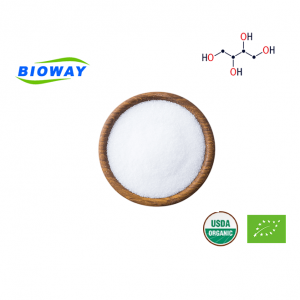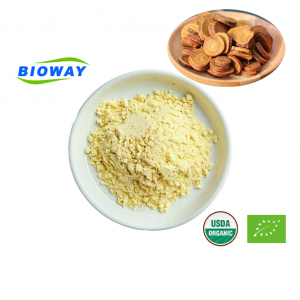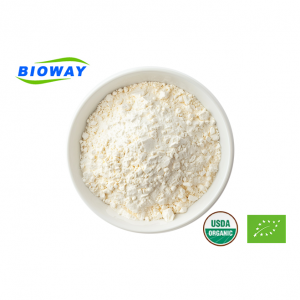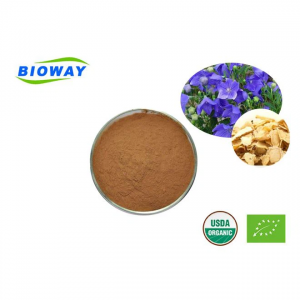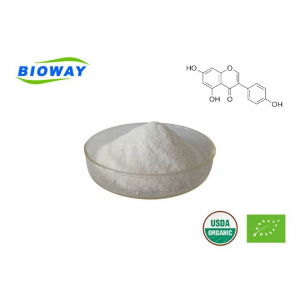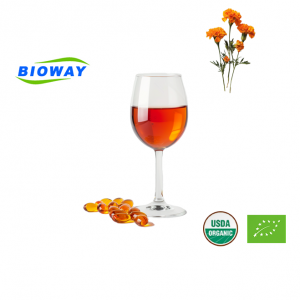Licorice Extract Pure Liquiritigenin Powder
Licorice Extract Pure Liquiritigenin Powder (98%HPLC) is a concentrated form of liquiritigenin, a natural compound found in licorice root. Liquiritigenin is a flavonoid with potential health benefits, including anti-inflammatory, antioxidant, and anti-cancer properties. The “98%HPLC” designation indicates that the powder has been standardized to contain 98% liquiritigenin, as verified by high-performance liquid chromatography (HPLC) analysis.
This type of licorice extract is often used in traditional medicine and herbal supplements for its potential therapeutic effects. It may be used in various formulations, including capsules, tinctures, or topical products. However, it’s important to note that concentrated extracts like this should be used with caution and under the guidance of a healthcare professional, as they can have potent effects and may interact with certain medications or health conditions. Contact us for more information: grace@biowaycn.com.
| Product name | Liquiritigenin Powder |
| CAS | 578-86-9 |
| Test Method | HPLC |
| Purity | 98% |
| Appearance | Milky White Powder |
| Shelf life | 2 years |
| Storage | Cool and dry place |
| Sieve analysis | 100% pass 80 mesh |
| Loss on Drying | ≤1% |
| Residue on Ignition | ≤1% |
| Microbiology | |
| Total Plate Count | <1000cfu/g |
| Yeast & Mold | <100cfu/g |
| E.Coli | Negative |
| Salmonella | Negative |
| Yeast & Mould | 100cfu/g Max |
| Other Related Product Names | Specification/CAS | Appearance |
| Licorice extract | 3:1 | Brown powder |
| Glycyrrhetnic acid | CAS471-53-4 98% | White powder |
| Dipotassium Glycyrrhizinate | CAS 68797-35-3 98%uv | White powder |
| Glycyrrhizic acid | CAS1405-86-3 98% UV; 5%HPLC | White powder |
| Glycyrrhizic Flavone | 30% | Brown powder |
| Glabridin | 90% 40% | White powder, Brown powder |
High purity: The powder is standardized to contain 98% liquiritigenin, as confirmed by high-performance liquid chromatography (HPLC) analysis. This indicates a high level of purity and concentration of the active compound.
Source: Derived from licorice root, a plant known for its natural compounds and traditional medicinal uses.
Potential health benefits: Liquiritigenin, the active compound in the extract, has been studied for its potential anti-inflammatory, antioxidant, and anti-cancer properties.
Versatile applications: The powder can be used in various formulations, including herbal supplements, traditional medicine, and potentially in cosmetic or skincare products due to its reported skin-brightening properties.
Regulatory compliance: The production and distribution of the powder should adhere to quality standards, certifications, and regulatory requirements.
Storage and handling: Proper storage conditions and handling guidelines to maintain the stability and shelf life of the product.
Melting point: 206-208°C
Boiling point: 529.5±50.0°C (predicted)
Density: 1.386±0.06g/cm3 (predicted)
Flashpoint: 207℃
Storage conditions: Store under inert gas (nitrogen or argon) at a temperature of 2-8°C
Solubility: 125mg/mL in DMSO (ultrasound required)
Form: powder
Acidity coefficient (pKa): 7.71±0.40 (predicted)
Color: white, BRN number 359378
1. Anti-inflammatory effects: Liquiritigenin, the active compound in the extract, has been studied for its anti-inflammatory properties, which may help reduce inflammation in the body.
2. Antioxidant activity: Liquiritigenin exhibits antioxidant properties, which can help protect cells from oxidative damage caused by free radicals.
3. Potential anti-cancer properties: Research suggests that liquiritigenin may have anti-cancer effects, including inhibiting the growth of cancer cells and inducing apoptosis (programmed cell death) in certain types of cancer.
4. Skin health: Liquiritigenin has been investigated for its potential to inhibit melanin production, making it a candidate for use in skincare products aimed at brightening and evening out skin tone.
5. Respiratory health: Licorice extract, including liquiritigenin, has been traditionally used to support respiratory health and may have potential benefits for conditions such as coughs and bronchitis.
6. Metabolic support: Some research suggests liquiritigenin may have metabolic effects, including potential anti-obesity and anti-diabetic properties.
1. Pharmaceutical industry, including traditional medicine, herbal supplements, and potentially in the formulation of drugs targeting inflammatory conditions or cancer.
2. Cosmetics and skincare industry, aimed at addressing hyperpigmentation and promoting even skin tone.
3. Nutraceutical industry, targeting inflammatory conditions, metabolic health, and overall well-being.
4. Food and beverage industry, targeting specific health benefits, such as anti-inflammatory or antioxidant properties.
5. Research and development, focused on its biological activities, potential therapeutic uses, and formulation development.
Packaging And Service
Packaging
* Delivery Time: Around 3-5 workdays after your payment.
* Package: In fiber drums with two plastic bags inside.
* Net Weight: 25kgs/drum,Gross Weight: 28kgs/Drum
* Drum Size & Volume: I.D.42cm × H52cm, 0.08 m³/ Drum
* Storage: Stored in a dry and cool place, keep away from strong light and heat.
* Shelf Life: Two years when properly stored.
Shipping
* DHL Express, FEDEX, and EMS for quantities less than 50KG, usually called as DDU service.
* Sea shipping for quantities over 500 kg; and air shipping is available for 50 kg above.
* For high-value products, please select air shipping and DHL express for safety.
* Please confirm if you can make the clearance when goods reach your customs before placing an order. For buyers from Mexico, Turkey, Italy, Romania, Russia, and other remote areas.
Payment And Delivery Methods
Express
Under 100kg, 3-5Days
Door to door service easy to pick up the goods
By Sea
Over300kg, Around 30 Days
Port to port service professional clearance broker needed
By Air
100kg-1000kg, 5-7Days
Airport to airport service professional clearance broker needed
Production Details (Flow Chart)
1. Sourcing and Harvesting
2. Extraction
3. Concentration and Purification
4. Drying
5. Standardization
6. Quality Control
7. Packaging 8. Distribution
Certification
It is certified by ISO, HALAL, and KOSHER certificates.
FAQ (Frequently Asked Questions)
Q: Is licorice extract safe to take?
A: Licorice extract can be safe when consumed in moderate amounts, but it’s important to be aware of potential risks and considerations. Licorice contains a compound called glycyrrhizin, which can lead to health issues when consumed in large quantities or over an extended period. These issues may include high blood pressure, low potassium levels, and fluid retention.
It’s advisable to consult with a healthcare professional before taking licorice extract, especially if you have pre-existing medical conditions, are pregnant, or are taking medications. Additionally, it’s essential to follow recommended dosages and guidelines provided by healthcare providers or product labels.
Q: Is licorice extract safe to take?
A: Licorice extract can be safe when consumed in moderate amounts, but it’s important to be aware of potential risks and considerations. Licorice contains a compound called glycyrrhizin, which can lead to health issues when consumed in large quantities or over an extended period. These issues may include high blood pressure, low potassium levels, and fluid retention.
It’s advisable to consult with a healthcare professional before taking licorice extract, especially if you have pre-existing medical conditions, are pregnant, or are taking medications. Additionally, it’s essential to follow recommended dosages and guidelines provided by healthcare providers or product labels.
Q: What medications does licorice interfere with?
A: Licorice can interact with several medications due to its potential to affect the body’s metabolism and excretion of certain drugs. Some of the medications that licorice may interfere with include:
Blood Pressure Medications: Licorice can lead to increased blood pressure and may reduce the effectiveness of medications used to lower blood pressure, such as ACE inhibitors and diuretics.
Corticosteroids: Licorice may enhance the effects of corticosteroid medications, potentially leading to an increased risk of side effects associated with these drugs.
Digoxin: Licorice may reduce the excretion of digoxin, a medication used to treat heart conditions, leading to increased levels of the drug in the body.
Warfarin and other Anticoagulants: Licorice may interfere with the effects of anticoagulant medications, potentially affecting blood clotting and increasing the risk of bleeding.
Potassium-depleting Diuretics: Licorice can lead to reduced potassium levels in the body, and when combined with potassium-depleting diuretics, it may further lower potassium levels, leading to potential health risks.
It’s crucial to consult with a healthcare professional, such as a doctor or pharmacist, before using licorice products, especially if you are taking any medications, to ensure there are no potential interactions or adverse effects.





